World
WHO Urges Countries to Impose Health Taxes – 50% Price Hike on Sugary Drinks, Tobacco, and Alcohol

According to media reports, the World Health Organization (WHO), during the United Nations Financing for Development conference held in Seville, Spain, called on countries to increase the prices of sugary beverages, tobacco, and alcohol by 50% through the implementation of health taxes over the next decade. The goal is to reduce the consumption of harmful substances and boost government revenues to address the growing public health crisis.
Jeremy Farrar, WHO Assistant Director-General for Health Promotion and Disease Prevention, stated that using health taxes to raise product prices can help lower the incidence of diseases such as diabetes and certain types of cancer. WHO Director-General Tedros Adhanom Ghebreyesus also noted that the increased revenue could be used to support healthcare systems.
The report further mentioned that the WHO added that between 2012 and 2022, nearly 140 countries had already increased tobacco taxes and prices by 50%. The newly proposed measures are expected to generate up to USD 1 trillion (approximately NTD 32 trillion) in tax revenue for countries by 2035, although resistance from related industries is anticipated.
- 37 reads
US-Japan Tariff Negotiations Stuck in Deadlock; Trump Threatens to Raise Tariffs to 35%

Before the July 9th tariff grace period, Vietnam successfully reached an agreement with the United States, and Trump also told the media that he would not consider extending the deadline. For several countries that failed to reach an agreement, the US would directly determine the tariff rates. However, Japan, which started negotiations earliest and was originally seen as Trump's model for tariffs, has still not reached a consensus with the US. Trump expressed frustration during an interview, saying, "Japan is being very tough, they’ve been spoiled all this time."
Trump stated, "The US and Japan have a great alliance, but when it comes to trade, it’s very unfair. That era is over." He added, "I also informed Japan that if you can’t meet our demands, the tariffs you’ll pay could be 30% or 35%, or any other figure directly determined by the US." Trump implied that, in case of a deadlock, tariffs might even exceed the originally planned 24%. He complained, "Japan is clearly in need of rice but refuses to accept American rice," and "Japan doesn’t buy American cars but exports millions of cars." He continued, "The trade deficit between the US and Japan is huge, which is very unfair to America."
Japan’s Minister for Economic Revitalization, Akira Amari, was supposed to meet with US officials for seven rounds of talks, but he did not meet with US Treasury Secretary Scott Bessent and returned home immediately. The market generally believes that the two countries will eventually reach an agreement, with Japan possibly being forced to make concessions. Former Japanese Ambassador to the US, Ichiro Fujisaki, commented, "In the end, we may reach a win-win result. But the US’s 'win' is in capital letters, and Japan’s 'win' can only be in lowercase."
- 34 reads
Thailand's Prime Minister Paetongtarn Shinawatra Suspended Due to "Phone Gate" Scandal
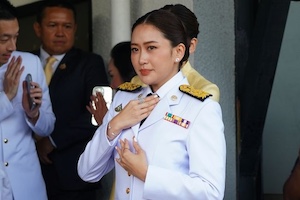
Thailand's Prime Minister Paetongtarn Shinawatra is facing an unprecedented political crisis due to a "Phone Gate" incident.
On July 1st, the Thai Constitutional Court announced that Paetongtarn and former Cambodian Prime Minister Hun Sen had engaged in private discussions over the Thai-Cambodian border dispute, which violated the constitution and professional ethics. As a result, Paetongtarn's position as Prime Minister was immediately suspended, and an investigation was launched. During the conversation, Paetongtarn referred to Hun Sen as "Uncle" in a submissive manner and criticized the Thai military's negotiation tactics with Cambodia as rough and damaging to the Thai government's sincerity. The leaked phone recording sparked widespread outrage, leading to massive street protests demanding Paetongtarn's resignation. As tensions rise over the Thai-Cambodian border conflict, Paetongtarn's position as Prime Minister is in jeopardy, and Thailand appears to be plunging into a new wave of political instability.
Thailand's political scene has been shaken recently. The Thai Constitutional Court ruled this week that the current Prime Minister Paetongtarn Shinawatra is temporarily suspended from office pending an investigation into the "Phone Gate" political scandal. This decision has attracted significant domestic and international attention, with the possibility of a new wave of political turmoil.
The "Phone Gate" scandal originated from a leaked recording of a suspected phone conversation between Paetongtarn and high-level business figures. The content of the call involved using her official power to influence cabinet appointments and potentially facilitate corporate policy favors. The recording went viral on social media several weeks ago, triggering public outrage. Opposition parties and civil organizations immediately called for an investigation, questioning whether Paetongtarn had overstepped her powers as Prime Minister and violated constitutional provisions. According to a statement from the Constitutional Court, in order to safeguard the fairness of the judicial process and administrative neutrality, Paetongtarn's duties would be temporarily suspended until the case was clarified. Her powers would be temporarily assumed by the Deputy Prime Minister. The court emphasized that this decision was not a conviction, but rather a necessary procedural step supported by initial evidence warranting further examination.
Paetongtarn's office expressed respect for the court's decision and emphasized that the Prime Minister had always acted in accordance with the law and had never sought to benefit specific individuals or groups. Paetongtarn herself, through her lawyer, issued a statement strongly denying the allegations and expressing willingness to fully cooperate with the investigation to clarify the facts.
Analysts suggest that this scandal could severely damage the government's reputation, destabilize the cabinet, and undermine investor confidence in Thailand. Currently, most members of the ruling party have expressed support for the Prime Minister, urging society to remain calm and wait for the results of the investigation. However, some opposition voices are calling for a comprehensive investigation to be conducted swiftly, with some even demanding the dissolution of parliament and a new election.
- 98 reads
Kagoshima Offshore Earthquakes Intensify in Japan, Over 100 Tremors in a Single Day Set New Record
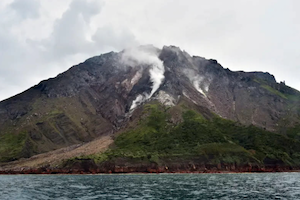
A series of earthquakes has been shaking the waters near Japan’s Tokara Islands (トカラ列島) in Kagoshima Prefecture since June 21. On June 29 alone, 103 tremors were recorded — marking a recent record in seismic activity. According to the Japan Meteorological Agency, the quakes are mainly concentrated around Akusekijima and Kobirojima islands, causing ongoing concern among local residents.
As of now, the total number of earthquakes has exceeded 600 and is nearing 700. On June 29, Akusekijima experienced at least three quakes with magnitudes over 4.0 — the highest daily total since June 24. A 73-year-old fisherman said he is frequently jolted awake at night by the sound of earthquakes and has reduced his fishing hours while reinforcing furniture at home to prevent damage.
The waters near Suwanosejima, Kobirojima, and Akusekijima are historically known for frequent seismic swarms. In September 2023, 292 felt quakes were recorded in just two days.
Although there have been no reports of injuries or property damage so far, the Japan Meteorological Agency has urged residents to remain alert for aftershocks and continuous shaking. People are advised to check disaster preparedness measures, including securing furniture at home. On the morning of June 30, 26 additional quakes were observed, the largest with a magnitude of 4.1. Later that afternoon, a magnitude 5.1 quake struck the area, reaching a seismic intensity of upper 5 on Japan’s scale. No tsunami was generated, but the event drew significant attention.
- 174 reads
Tai Ji Men to Bring Ancient Spirit and Modern Energy to East York’s Canada Day Parade

On July 1, 2025, the streets of East York will come alive with joy and unity during the 59th Canada Day Parade and Festival—one of the Greater Toronto Area’s most anticipated cultural celebrations. Among the vibrant mix of floats, marching bands, and performers, Tai Ji Men will make its exciting debut, adding a mesmerizing blend of ancient Eastern wisdom and modern vitality to the festivities.
- Read more
- 976 reads
UK Plans to Appoint Special Envoy to Rescue Citizens Detained Abroad, Following US Model
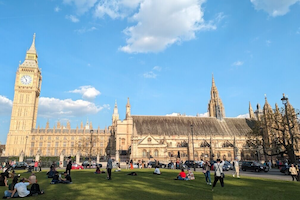
In response to growing calls to better protect British citizens arbitrarily detained abroad, the UK is considering following the U.S. model by appointing a special envoy to handle complex consular detention cases. The Foreign Office emphasized that it will continue to pressure foreign governments and strengthen support for British nationals.
High-profile international cases, such as Egyptian-British activist Alaa Abd El-Fattah and Hong Kong media figure Jimmy Lai, have highlighted the difficulties faced by Britons imprisoned overseas. Human rights groups and families of detainees have criticized the UK government for a lack of efficiency and transparency, urging immediate action.
While the UK has yet to announce the specific responsibilities of the proposed envoy, the role is expected to resemble the U.S. Special Presidential Envoy for Hostage Affairs established in 2015. However, unlike the U.S., the UK does not engage in prisoner exchanges. Professor Carla Ferstman, an expert on arbitrary detention at the Human Rights Centre, University of Essex, said the appointment of a special envoy is "the most obvious thing the UK could do but hasn’t done yet."
- Read more
- 51 reads
Lithuanian Parliament Proposes Constitutional Amendment to Allow 16-Year-Olds to Vote in Local Elections
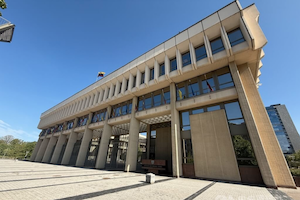
The Lithuanian Parliament held a preliminary vote on the 26th, with 78 votes in favor, 3 against, and 8 abstentions, initiating the constitutional amendment process to lower the eligible voting age for local mayoral and municipal council elections from 18 to 16.
Currently, both the Constitution and civil law of Lithuania set the voting and legal adulthood age at 18. The proposed amendment was introduced by Social Democratic Party MP Tomas Martinaitis, who argued that 16-year-olds should be granted voting rights to strengthen democracy and encourage youth participation in local governance. He stated, “Many young people leave their hometowns after turning 18. At 16, they are still closely connected to their communities, making it an ideal time for civic engagement.” He also pointed out that international experience shows that the earlier individuals participate in elections, the more likely they are to remain politically active in the future.
However, the proposal has faced opposition from conservative lawmakers. MP Audronius Azubalis argued that 16-year-olds are not mature enough to take on political decision-making responsibilities and criticized the move as “depriving young people of the process of becoming mature citizens.” The Parliament’s legal department also expressed concerns, noting that the Constitution should not be amended lightly and questioned whether there is currently a “compelling necessity” for such a change.
The proposed constitutional amendment must undergo committee review and be passed in two separate parliamentary votes, each requiring a two-thirds majority (at least 94 votes). Additionally, the two votes must be held at least three months apart. If successfully adopted, Lithuania would follow Estonia in becoming the second country in Europe to allow 16-year-olds to vote in local elections.
- 36 reads
Iceland Tops Global Peace Index for 17th Consecutive Year; Taiwan Ranks 40th, Russia at the Bottom
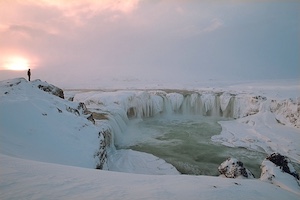
The 2025 Global Peace Index has been released, ranking 163 countries worldwide. Iceland claimed the top spot for the 17th consecutive year. Taiwan ranked 40th, China came in at 98th, and the United States was placed 128th—behind countries like Zimbabwe and India—while Russia ranked last.
The Global Peace Index is compiled by the international think tank Institute for Economics and Peace (IEP). It evaluates peace based on three major domains: “Societal Safety and Security,” “Ongoing Domestic and International Conflict,” and “Degree of Militarization,” using 23 qualitative and quantitative indicators. Each indicator is scored from 1 to 5, with lower scores indicating a higher level of peace. The index ranks 163 countries in total.
According to the report, the ten most peaceful countries in 2025 are, in order: Iceland, Ireland, New Zealand, Austria, Switzerland, Singapore, Portugal, Denmark, Slovenia, and Finland.
The report also notes that global peace has been deteriorating annually since 2014. Currently, there are 59 conflicts between states, the highest number since the end of World War II. In 2025, global peace declined by 0.36%, reaching its lowest level since the index was first established. Rising conflict-related deaths, increased geopolitical tensions, and the growing assertiveness of middle powers are driving what the report calls “The Great Fragmentation”—a fundamental reshaping of the global order that signals the dawn of a new geopolitical era.
- 346 reads
Israeli Prime Minister Involved in Corruption; Trump Offers Support
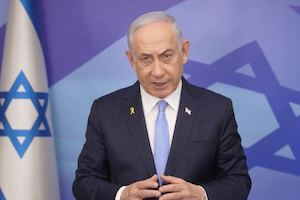
Let me know if you'd like it phrased more formally or in a journalistic tone.On the 25th, U.S. President Donald Trump posted on his social media platform "Truth Social," stating that the corruption charges against Israeli Prime Minister Benjamin Netanyahu are "politically motivated." He called on Israel to immediately cancel the trial against Netanyahu or have the president grant him a pardon. Netanyahu had publicly declared the previous day that Israel has never had a better friend in the White House than Trump.
Prime Minister Netanyahu was indicted in 2019 on charges of bribery, fraud, and breach of trust. The trial proceedings began in May 2020, making Netanyahu the first sitting Israeli prime minister to stand trial as a criminal defendant. However, due to the outbreak of the Gaza war and later the conflict with Lebanon, the court proceedings were repeatedly postponed at Netanyahu's request. He finally testified in court for the first time on December 10, 2024, and has denied all charges. Netanyahu is scheduled to appear in court again next Monday.
In response, Trump posted on "Truth Social" that he and Netanyahu had just gone through an ordeal together, fighting against Israel’s enemies. He praised Netanyahu as a "warrior" and condemned the legal proceedings against him as a "political witch hunt." Trump declared that the United States saved Israel, and now it must save Netanyahu as well. He urged Israel’s judicial system to drop the trial or issue a pardon.
According to Israel’s constitution, the president holds the power of pardon. However, the current president, Isaac Herzog, stated that granting a pardon to Netanyahu is not on the current agenda, indirectly rejecting Trump’s call.
- Read more
- 50 reads
NATO Allies Agree to Raise Defense Spending to 5% of GDP; Trump Elated and Supports Continued U.S. Membership in NATO
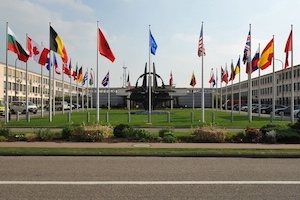
On June 24–25, a NATO summit was held in The Hague, Netherlands. Following the summit, NATO leaders issued a five-point statement reaffirming unity and pledging that member nations would commit 5% of their annual GDP to defense and security spending by 2035. This increase is intended to address the long-term threat posed by Russia and to enhance transatlantic defense industry cooperation. The next NATO summit in 2026 will be held in Turkey.
U.S. President Donald Trump made a special trip to the Netherlands to attend the summit. Before boarding his flight, he expressed frustration—using explicit language—over Israel and Iran exchanging missile fire despite agreeing to a ceasefire. During a media session alongside NATO Secretary General Mark Rutte, Trump likened the Israel-Iran conflict to "two unruly children fighting," to which Rutte responded by comparing Trump to a father trying to mediate a quarrel.
Ukrainian President Volodymyr Zelenskyy also spoke with Trump at the summit in what was reported to be a positive and constructive interaction. Trump stated he might provide additional Patriot missiles to Ukraine to defend against ongoing Russian airstrikes. He also acknowledged that negotiating a Russia-Ukraine ceasefire has proven "much more difficult than expected," noting that "Putin is not easy to deal with" and admitting there had been issues with Zelenskyy in the past as well.
Trump used the context of the Russia-Ukraine war to underscore the urgency and importance of a strong defense industrial base. He stressed that NATO members must not rely on foreign adversaries for critical minerals. In May, the U.S. and Ukraine signed a mineral agreement to secure natural resources and ensure continued American support for Ukraine.
As a response to these concerns—and aligning with Trump’s long-standing demands—the joint statement from the summit declared that NATO allies would raise their defense spending to 5% of GDP. Of this, 3.5% will go toward core defense needs, and 1.5% will be allocated to protecting infrastructure and strengthening the defense industrial base.
- 52 reads
Human Rights
Fostering a More Humane World: The 28th Eurasian Economic Summi

Conscience, Hope, and Action: Keys to Global Peace and Sustainability

Ringing FOWPAL’s Peace Bell for the World:Nobel Peace Prize Laureates’ Visions and Actions

Protecting the World’s Cultural Diversity for a Sustainable Future

Puppet Show I International Friendship Day 2020

